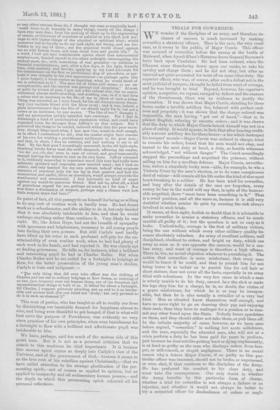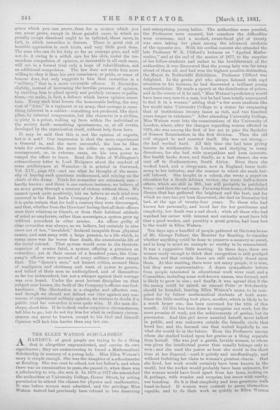TRIALS FOR COWARDICE.
WE wonder if the discipline of an army, and therefore its chance of success, is much increased by making cowardice a statutory offence. Htre is the case, the very cruel case, as it seems to the public, of Major Currie. This officer was accused of cowardice before the enemy at the battle of Maiwand, when Ayoub Khan's Heratees drove General Burrows's force back upon Candahar. He had been ordered, when the Ghazees came thundering down upon our ranks, to take his cavalry and charge thorn ; and he did not obey, but after an interval not quite accounted for went off on some other duty. His superior officer, who was, of course, after such a defeat not in the most judicial of tempers, thought he failed from want of courage, and he was brought to trial. Beyond, however, his superior's opinion, a superior, we repeat, enraged by failure and the censure of the Government, there was no evidence to justify the accusation. It was shown that Major Currie, standing for three hours under a terrible artillery fire, behaved with perfect cool- ness and propriety ; it was shown that the charge ordered was impossible, the men having "got out of hand,"—that is, in plainer English, refusing to execute orders ; and it was shown that the duty to which Major Currie betook himself was not in a place of safety. It would appear, in fact, that after bearing credit- ably a severe artillery fire for three hours—a fire which destroyed his troopers' morale—Major Currie was ordered to charge, tried to execute his orders, found that his men would not obey, and turned to the next duty at hand, a duty, an hostile witnesses
acknowledged, "not without danger." The Court accordingly stopped the proceedings and. acquitted the prisoner, without calling on him for a needless defence. Major Currie, neverthe- less, unless a singularly lucky man—able, for example, to win a Victoria Cross by the men's election, or to do some conspicuous deed of valour—will remain all his life under the kind of slur most heart-breaking to a soldier. Ho has been tried for cowardice, and long after the details of the case are forgotten, every enemy he has in the world will say that, in spite of the honour- able acquittal, there must have been something in it." That is a cruel position, and all the more so, because it is still very doubtful whether armies do gain by running the risk always involved in such trials.
It seems, at first sight, foolish to doubt that it is advisable to make cowardice in armies a statutory offence, and to court- martial all guilty of it ; but the question is not so easy as it looks. Undoubtedly, courage is the first of military virtues, being the one without which every other military quality be- comes absolutely valueless. An army of excellent soldiers, well disciplined, obedient to orders, and bright on duty, which ran away as soon as it was opposite the cannon, would be a use- less army, and want of courage is therefore a high offence. There is, too, no moral objection whatever to punishing it. The notion that cowardice is mere misfortune, that every man would be brave if he could, and that to punish him for not being brave is as unfair as to punish him for red hair or short stature, does not cover all the facts, especially in an army filled with volunteers. In the very few cases in which a man is utterly unable to do his duty, cannot face the shot or make his legs obey him for a charge, he is, no doubt, the victim of a grave misfortune, for which he is or may be irrespon- sible, but then he is also usually a swindler of a very bad kind, Men so situated know themselves well enough, and have no more right to go on drawing their pay and enjoying their rank, than they have to malinger for a pension or to com- mit any other fraud upon the State. Nobody forces epaulettes on them, and they should either not take them, or pull them ofr. In the infinite majority of cases, however, as we have once before argued, " cowardice " is nothing but acute selfishness, and the man, especially the educated man, who will not at a crisis perform a duty he has been paid for years to perform, just because he does not like getting hurt or dying unpleasantly, is at least as guilty as the man who disobeys orders from tem- per, or self-conceit, or stupid negligence. There is no moral reason why a future Major Currie, if as guilty as this par- ticular officer was innocent, should not be broke, or imprisoned, or even shot, if that conduces to the discipline of the Army. Be has preferred his comfort to his clear duty, and must take the consequences. Our only doubt is whether the Army benefits by this particular form of charge, whether a trial for cowardice is not always a failure or an injustice, and whether it would not always be better to try a suspected officer for disobedience of orders or negli- gence which you can prove, than for a motive which you can never prove, except in those painful cases in which no penalty except dismissal ought to be inflicted, those cases, in fact, in which cowardice is disease. There is great risk of- horrible oppression in such trials, and very little good done. The man who can do his duty so far as courage goes, and will not do it owing to a selfish care for his skin, under the tre- mendous compulsion of opinion, so inexorable in all such cases, will see in a formal trial only a hope of rehabilitation, not an additional compulsion. The law does not make him more willing to obey it than his own conscience, or pride, or sense of honour does, but only suggests to him that cowardice is a "military," that is, a more excusable offence. It diminishes slightly, instead of increasing the terrible pressure of opinion, by enabling him to plead openly and publicly excuses or pallia- tious,—to make, in fact, a defence which leaves opinion uncer- tain. Every such trial lowers the honourable feeling, the very root of "tone," in a regiment or an army, that courage is some- thing inherent in a soldier—something not produced, like disci- pline, by external compression, but like character in a civilian, or piety in a priest, welling up from within the individual or the society itself—something spontaneous, or, at all events, developed by the organisation itself, without kelp from laws.
It may be said that this is not the opinion of experts, but is it not ? Our impression is that the more experienced a General is, and the more successful, the less he likes trials for cowardice, the more he relies on opinion, on en- couragement, or, in extreme cases, on his own power to compel the officer to leave. Read the Duke of Wellington's extraordinary letter to Lord Mulgrave about the conduct of some artillerymen at Waterloo—it is printed in Garwood, Vol. XIV., page 618—and see what he thought of the neces- sity of leaving such questions undiscussed, and relying on the chiefs of the Army. Trials for cowardice are extremely rare— hardly known ; and there is one curious instance, we believe, of an army going through a century of victory without them. We cannot speak quite positively, but we believe no such trial ever occurred in the East India Company's Army. At all events, it is quite certain that for half a century they were discouraged, and that, whether from the Directors' feeling that all their officers were their relatives or friends, or from their habitual attitude of mind as employers, rather than sovereigns, a system grew up without precedent in other armies. An officer guilty of clear cowardice was always, as we believe, but certainly in nine cases out of ten, "invalided," declared incapable from physical causes, and sent away with a large pension, to a life which, in many cases was far worse than death, the unendurable life of the social outcast. That system would seem to the theoretic .organiser of armies fatal, a system offering a premium on cowardice; yet in their career of a hundred years, the Com- pany's officers were accused of every military offence except that. The "Queen's men," not lenient critics, accused them of negligence and obstinacy and want of power to govern, and talked. of their men as undisciplined, and of themselves as far too independent, but not a whisper against their courage was ever heard. Under the most lenient discipline on that subject ever known, the faultof the Company's officers was fool- hardiness. The illustration is a singular and. effective one, and though we should not defend our view against any con- sensus of experienced military opinion, we venture to doubt if a public trial for cowardice is ever quite wise. If the man dis- obeys, shoot him. If he is slack under suspicious circumstances, tell him to go ; but do not try him for what in ordinary circum- stances can never be known, except to his God, and himself. Opinion will lash him harder than any law can.



































 Previous page
Previous page